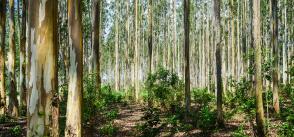
Egyptian researchers discover a way to grow forests in the desert with sewage
Located about two hours from Cairo, the Serapium forest is part of a program initiated by the Egyptian government in the 90s. The 200-hectare plantation is home to a variety of native and non-native trees, including commercially valuable species like eucalyptus and mahogany. Though the soil in this area would normally be too devoid of nutrients to support new tree growth, researchers have found that by watering the trees with sewage effluent, the plants are able to flourish. The wastewater provides so many nutrients that additional fertilizer isn’t even necessary.
[Full article here | Photo by jbdodane]







